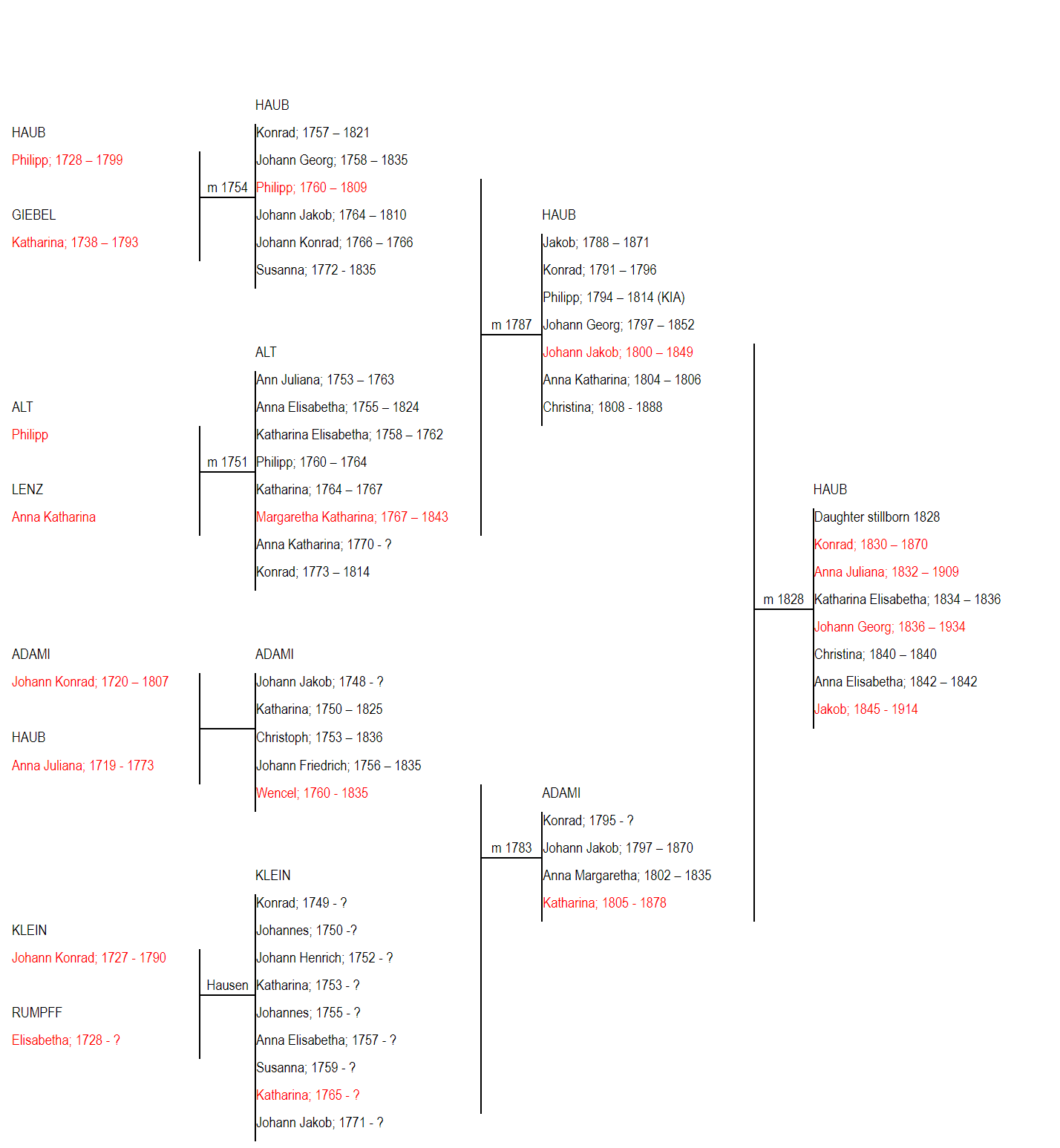Anna Juliana HAUB 1832-1909
Anna Juliana was the elder of the two daughters of farmhand Johann Jakob Haub and Katharina nee Adami who survived childhood; she was born on 28th August 1832. There were also three brothers who, like Anna Juliana, were destined to end their lives in Australia.
In the abnormal conditions prevailing in the village, Anna Juliana received no education, being unable even to write her name. As she grew up, she helped her mother look after the younger children and the house. Her father died when she was sixteen and, like many of the mothers in the village, Katharina sent her daughter to England to protect her from the real dangers facing her. It is likely that Anna Juliana’s young sister, Katharina Elisabetha, went with her.
The usual journey was from Frankfurt along the Rhine to Rotterdam, and then by steam packet to Hull. On arriving there, many migrants looked for work in this industrial port. Having the musical talent so common to the German race, Anna Juliana was able to maintain an adequate standard of living by playing in a musical group. One of the other players was Friederich Geisler, a widower from Alpenrod. Their acquaintanceship led to romance, and the couple were married on 25th October 1855 in Bethesda Chapel, Kingston-upon-Hull. The two witnesses were Christoph Maas and Jakob Haub from Nieder-Weisel.
Friedrich and Anna Juliana set up house in 2 Collins Yard, in West Street, Hull and a son, George, was born there the following year. In 1856, the couple decided to migrate to Victoria. They left from Liverpool on 1st December on board the “Columbia” with other members of Anna Juliana’s family, including her mother, Katharina. The group reached Melbourne on Wednesday, 18th March 1857 and made its way to Ballarat. Friedrich went prospecting on the goldfields being opened up around Maryborough, north of Ballarat. Anna Juliana gave birth to their second son, Jacob, in the township of Avoca in 1859. With her mother to help her, Anna Juliana was able to tackle the difficult cross-country journey to Bendigo, and then on to Rushworth, where Conrad was born the next year.
In December 1862 Anna Juliana had twins. Mary Ann lived but Henry died soon after birth. Her brothers, Jakob and Johann Georg, had gone to central New South Wales and, in 1864, the Geisler family moved to Young to join them, taking Katharina with them to help with the four young children. Anna Juliana had a daughter Catherine in 1865 and she stayed on in Young until the marriage of her brother Jakob in 1866, while Friedrich returned to Rushworth.
Anna Juliana and Friedrich settled at Moora, near Rushworth, where Friedrich went farming. Initially, Anna Juliana had her mother and three brothers living close by. She had another daughter, Margaret born 1868, and this completed her family. In 1870 Konrad died from injuries received in a mine collapse – despite a very brave effort by Anna Juliana’s son, Jacob, to save him. Katharina died in 1878.
In 1870 the 17 year old Mary Ann gave birth to a son and, in 1883, pregnant for a second time, she married Johann Georg Haub, her uncle; they moved away to settle in New South Wales. Jakob and his family did the same, leaving only the Geislers in Rushworth. Their other children began to marry soon after this. Catherine and Conrad were married, in 1884, in an unusual double ceremony to Thomas and Mary Ann Popple and settled in nearby Murchison. George was married the same year to Elizabeth Whittaker. Margaret married Robert Brideson in 1895 and remained in Rushworth.
Friedrich continued farming until he retired; he took out letters of naturalisation in 1895. Anna Juliana had never learned to read, so Friedrich spent many hours reading to her in the evenings. They retained their love of music and of dancing, and passed these onto their children. Anna Juliana was widowed in 1903 when her husband of 47 years died in 1903, aged 77. She lived for six years longer, dying of bronchitis in her home on 9th February 1909. She was buried with Friedrich in the Rushworth Cemetery.
View Anna Juliana's Family Chart

